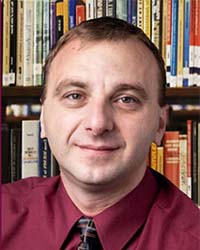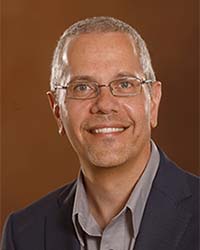Materials and Nanoscience
Innovating at the molecular level to address global challenges
At Central Michigan University, our Materials and Nanoscience research program pushes the boundaries of molecular design, enabling the creation of polymers and nanoscale systems with precise chemical, physical, and biological functions. From cutting-edge energy storage solutions to biomedical and environmental breakthroughs, our faculty lead dynamic, interdisciplinary efforts that prepare students to tackle real-world problems with scientific rigor and innovation.
Research focus areas and faculty expertise
Dr. Gabriel Caruntu
Functional Nanomaterials for Energy, Sensors, and Spintronics

Dr. Caruntu’s research focuses on the design and fabrication of functional nanostructures for use in energy storage and conversion, catalysis, sensing, and spintronics. His team leverages principles of colloidal chemistry, molecular self-assembly, and surface engineering to construct precisely controlled nanocrystals, nanotubes, nanorods, and thin films with advanced functionality and performance.
Dr. Bradley D. Fahlman
Nanostructured Materials for Energy Storage

The Fahlman Group develops and evaluates mesoporous carbons, graphenes, and Si-C hybrid nanomaterials for next-generation batteries and supercapacitors. Utilizing both liquid- and vapor-phase synthetic techniques (e.g., CVD, ALD), the lab conducts high-resolution material characterization and advanced electrochemical testing using custom-built systems for real-time, high-throughput battery analysis.
Dr. Bingbing Li
Hierarchical Polymer Architectures for Biomedical and Environmental Impact

Dr. Li leads the development of structured polymer systems with tailored properties for real-world applications. Her team explores the fundamental physical chemistry of polymeric materials and integrates design principles and property optimization to develop solutions for biomedical and environmental challenges.
Dr. Anja Mueller
Functional Materials for Environmental Remediation and Biomedicine

Dr. Mueller’s interdisciplinary group develops novel materials for applications such as wastewater treatment, proton exchange membranes, and biopolymer scaffolds for tissue engineering. She also leads innovative research in STEM education, focusing on interdisciplinary learning and the advancement of active learning strategies in organic chemistry.
Join the next generation of innovators
Students involved in CMU’s Materials and Nanoscience program gain hands-on experience with state-of-the-art instrumentation, work alongside faculty on high-impact research, and are prepared to pursue graduate programs, industry positions, or careers in research and development. Discover how you can contribute to scientific breakthroughs that address some of today’s most pressing challenges.
